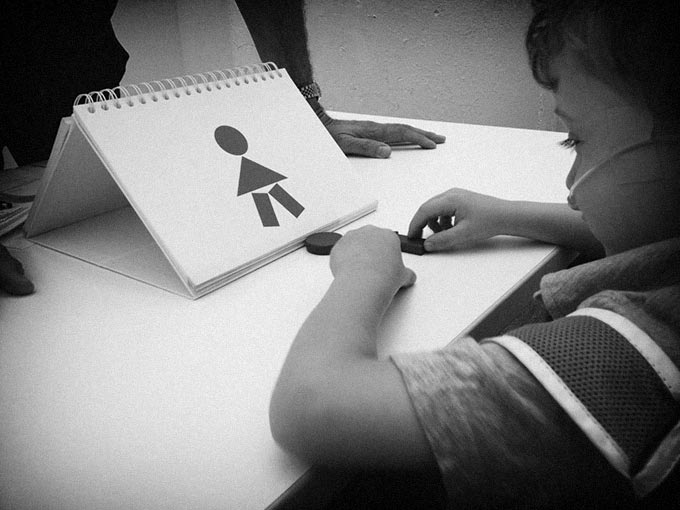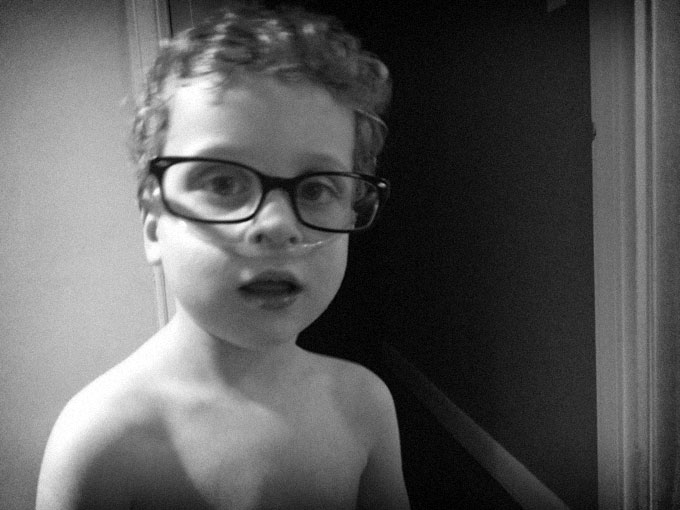Big news: C no longer needs supplemental oxygen!

Above: an oxygen-free C.
When C first got sick almost three years ago, we had no idea what was wrong. Neither did his pediatrician. After a few months of declining health without answers, we carried our pale, faltering little boy in our arms to the local ER where they discovered his oxygen levels were dangerously low - in the 70s (below 90% is considered dangerous). On top of that, his CO2 levels were dangerously high. Not good.
He was put on supplemental oxygen immediately and has been on it continuously until just a few weeks ago. (Aside: we will always wonder if this period without oxygen was partially responsible for triggering his autism.)

Above: C the night of his emergency admit (the first one, I should say).
It took almost six months to get an official diagnosis. Before that, we got varying theories about what might be causing his respiratory problems ranging from cystic fibrosis to something called bronchiolitis obliterans. At one point, we were told C might have a disease that would require a lung transplant, and which could result in death. Shit.

Above: C feeling better after just one evening on supplemental oxygen.
Thus it was with a giant cry (literally) of relief when the results of a lung biopsy revealed that C had a very rare but relatively benign pediatric lung disease known as neuroendocrine hyperplasia of infancy, or NEHI for short. Less than a few hundred children worldwide are diagnosed with this disease. Little is known about its cause, there is no cure, and the only treatment is supplemental oxygen. It's no cakewalk, but it was better than many of the other potential diseases we were facing: NEHI is not deadly, doesn't require a lung transplant and, as far as the research goes, all children afflicted with it will ultimately outgrow the need for supplemental O2.
We thanked our lucky stars and settled in for the long haul: life with a child on oxygen.
Smokers take note: life on oxygen is a major hassle, not to mention a financial burden. With a child, it's even worse: oxygen tubes knock everything over; explosive oxygen tanks get stored in closets; noisy oxygen equipment constantly gasps around the house; people stare; insurance companies balk at expenses and you do battle for your child; and of course there is the ever-present fear that the next cold will result in another hospital stay.
Still, we're lucky. C is off oxygen, and just before preschool! (To those schools who discriminated against our son because of his medical condition: screw you. We might have sued you if we had the energy, money, and the time. Instead, you bullied us and lied to us. I apologize for the outburst but I had to get that off my chest.)
We will keep the oxygen equipment around for awhile, just in case C has a relapse. There is no study which has confirmed whether NEHI ever truly disappears, or if the lungs simply grow large enough to compensate for the diseased areas. What we do know is that his saturation levels are healthy, and the latest pulmonary function test revealed vastly improved lung elasticity and reduced air trapping. His lungs aren't perfect, but they're much better than just a year ago.

Above: C at a water park around the time of his first confirmed autism diagnosis.
We are thrilled and relieved. Life will be easier in many ways. But I would be lying if I told you this news brought us profound happiness. This outcome means we can simply refocus all our energies on the more pressing issue of autism. I don't mean to say we're not grateful and happy: we are. Most of all, we're grateful that C will enjoy life without the limitation being dependent on supplemental oxygen.
People have asked what C's reaction is to being off oxygen. Does he notice it? Is he happier? I wish I could say he was thrilled to be off it, but the truth is that he hasn't shown any real difference in demeanor. His usual obliviousness is, in this case, a blessing: he never really seemed to mind being on oxygen in the first place.
That said, the other night I asked him if he missed his (ever-present) nasal cannula. His response? He smiled and stuck his fingers into his nostrils.
That's my boy!
///
If you would like to support a fantastic organization that does a lot to help parents of children with pediatric lung disease, please visit chILD Foundation and consider making a donation.



 Tonight during bath time I heard C saying, "I am Daddy!" When I investigated, I found him sitting at my desk wearing my glasses, pretending to type on my computer.
Tonight during bath time I heard C saying, "I am Daddy!" When I investigated, I found him sitting at my desk wearing my glasses, pretending to type on my computer.